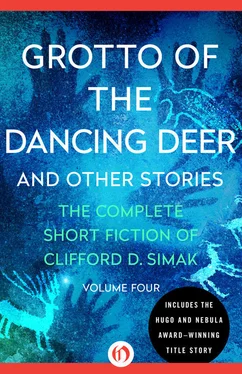“You sound as if you knew him fairly well, Ezra.”
“Oh,” said Pike, “we had our differences. He was a hard man to get along with. Unreasonable and had a bad temper. Had some funny ideas, too. He was an organic farmer. Never put a pound of commercial fertilizer on his land, refused to use pesticides. Said they were poison. Long before that lady wrote her book about a ‘silent spring,’ he said that they were poison.”
Benton sat straight up. “You mean he never used any pesticides? No DDT at all?”
“That’s what I mean,” said Pike. “And the funny thing about it was that he grew as good a crop as any of the rest of us—that is, as long as he grew any crops. As he grew older, he farmed less and less. A good part of his land was idle. But what little he farmed, he farmed well. Abner was a first-class farmer.”
Pike stayed a while longer and they talked of other things, but Benton scarcely heard him. His mind was buzzing with what Pike had said about Abner Young never using pesticides.
DDT! Benton thought. For the love of Christ, could it be DDT?
Here was the Barr family, farmers out of Ohio, where they probably had used DDT, then moving to a farm where not a grain of the chemical ever had been used. And among all the farmers in the valley, they were the only ones who had suffered from the exhaustion syndrome. Could it be that they had gotten used to DDT or something else in the pesticides, and now were sick because of the lack of it?
The other farmers were okay, he figured, because there still were traces of DDT in their soil, and by working in the soil they were picking up enough of it not to yet experience any ill effects from the lack of it.
And the folks out in the hills? That was simple enough, he told himself. They had never been exposed to it, had never developed whatever need for it the others had acquired. They had never been exposed to it because they were so bone poor they could not afford to buy it. Raising their own food, consuming what they grew, never eating commercially canned foods or buying foods that might have been grown on DDT-drenched land, they had never been exposed.
The next day was Saturday, and in the afternoon, after office hours were over, Benton went through his files once again and found what he had expected to find: that, with only two exceptions, townspeople who had gardens and who actually worked in them had never mentioned any of the symptoms of the exhaustion syndrome.
He phoned Helen Anderson. When she came on the line, he said, “This is your friendly family physician and I’m going to ask you a silly question. Please don’t laugh at me, for maybe it’s important.”
“Ask away. You know I wouldn’t laugh at you.”
“All right, then. When DDT was still available, before it was banned, did you use it in your garden?”
“Sure I did,” she said. “I think most gardeners did. I used it for years and years, and I tell you I miss it. This new stuff, the bugs positively like it. They lap it up and settle down to wait for more. It doesn’t even faze them. Herb used to fuss at me for using DDT. He said he didn’t want his vegetables salted with chemicals.”
“And Herb? Herb never works in the garden, does he?”
“Doc, you know damn well he doesn’t. He makes fun of me and my gardening. You have heard him do it.”
“But he eats stuff from the garden?” Benton asked.
“Are you kidding? Of course he does.”
“Fine,” he said. “Thank you for not laughing.”
“Doc, what is going on? Has this got something to do with Herb—with the way he feels?”
“Maybe. I don’t know yet. Maybe I’ll never know. I’m just scrabbling around.”
“All right,” she said. “I won’t ask. When you know, you’ll tell me?”
“You can count on that.”
He made several other phone calls to people who had gardens and to those who didn’t. The two exceptions said they had never used DDT because they didn’t want to mess around with it. It was too much work, they said. No, they said, their gardens didn’t do as well without it and through the summer they had always bought some garden stuff from others and, like most people, had always used a fair amount of canned goods.
All of them wanted to know why the doctor asked, and some of them laughed at him; but that was all right, he thought, it didn’t mean a thing. Everyone knew that old Doc had some strange ideas, like the time when he had raised so much hell about the water from the old municipal well that a new one had to be drilled, or the time of his strict insistence, as the town’s health officer, that all garbage cans must be covered. Old Doc, everyone agreed, was a fuddy-duddy; but they loved the man and went along with his craziness.
He hung up the phone after his last call and stared at the pad on which he had made notes as he made the calls.
This could be it, he thought; enzymes and DDT. Was it possible that a coenzyme, by forming a bond with a molecule of DDT, had become a super-catalyst? And now that DDT was no longer available, the super-catalytic action was no longer possible. That, he told himself, could account for the symptoms of the exhaustion syndrome.
Take coenzyme A, the one so intimately tied up with two biochemical cycles—the fatty-acid cycle, for example, which operates to oxidize lipids. Deprived of the super-catalyst on which the people had come to depend, fewer lipids would be oxidized and more would be stored as fat. Thus, an increasing incidence of obesity. With fewer lipids being broken down, the body would have to depend almost totally on carbohydrates for energy. Thus, the need for between-meal snacks.
Carbohydrates are transformed into useful body energy by means of the citric-acid cycle and the glycolysis process. The citric-acid cycle also involved coenzyme A, while the glycolysis process did not. if the two processes should become irregular, a seesawing effect, where one effect took over when the other faltered, and vice versa, could have far-reaching consequences. The blood sugar level would become erratic, a great deal produced at one time, very little at another. Lactic acid production would rise when the citric-acid cycle slowed down, since one of the functions of the cycle was to break down lactic acid. One result of a rise in lactic acid would be sore and aching muscles. And, in addition to the variation in blood sugar levels, the production of insulin also would be erratic. As a result of both conditions, there would be times when the brain would starve for lack of glucose in the blood. The symptoms would vary from fainting spells, convulsions, and shock to grogginess, irritability, and bleary vision.
It fit! he realized. It all fit, perhaps too perfectly.
He felt a moment of panic and distrust. He was going at it wrong, he knew. He was working with deduction. There should be extensive laboratory testing. But he was not qualified for laboratory work of the caliber required. He was going on a hunch alone, with no real evidence. His conclusions were unscientific and medically unacceptable. But the pattern was there, all logically laid out.
It was logical, he told himself, not only physiologically, but in other ways as well. It made sense evolutionally. Under the pressure of modern living, man was burning up more energy than he ever had before. Perhaps it was possible he had outrun the biochemical functioning of his body. Under such a circumstance, the body, as an evolutionary life system, would use anything available to permit it to function more efficiently. If DDT were something that would help it to do a better job, if DDT made the enzymes or even one enzyme into a super-catalyst that would do a better job, the body unhesitantly would latch onto DDT.
But now that the DDT was gone, the human body had gone back to where it was before. Among those people to whom DDT had not been available, the hill people for example, the old non-DDT system was still functioning, perhaps not as efficiently as if DDT had been available, but at least not disturbed by having become a new system which had operated successfully for a time but now was lost. Those whose bodies had become accustomed to the DDT system now were suffering a reaction—the old non-DDT system was sluggish in recovering, if it ever could recover, its old efficiency.
Читать дальше












